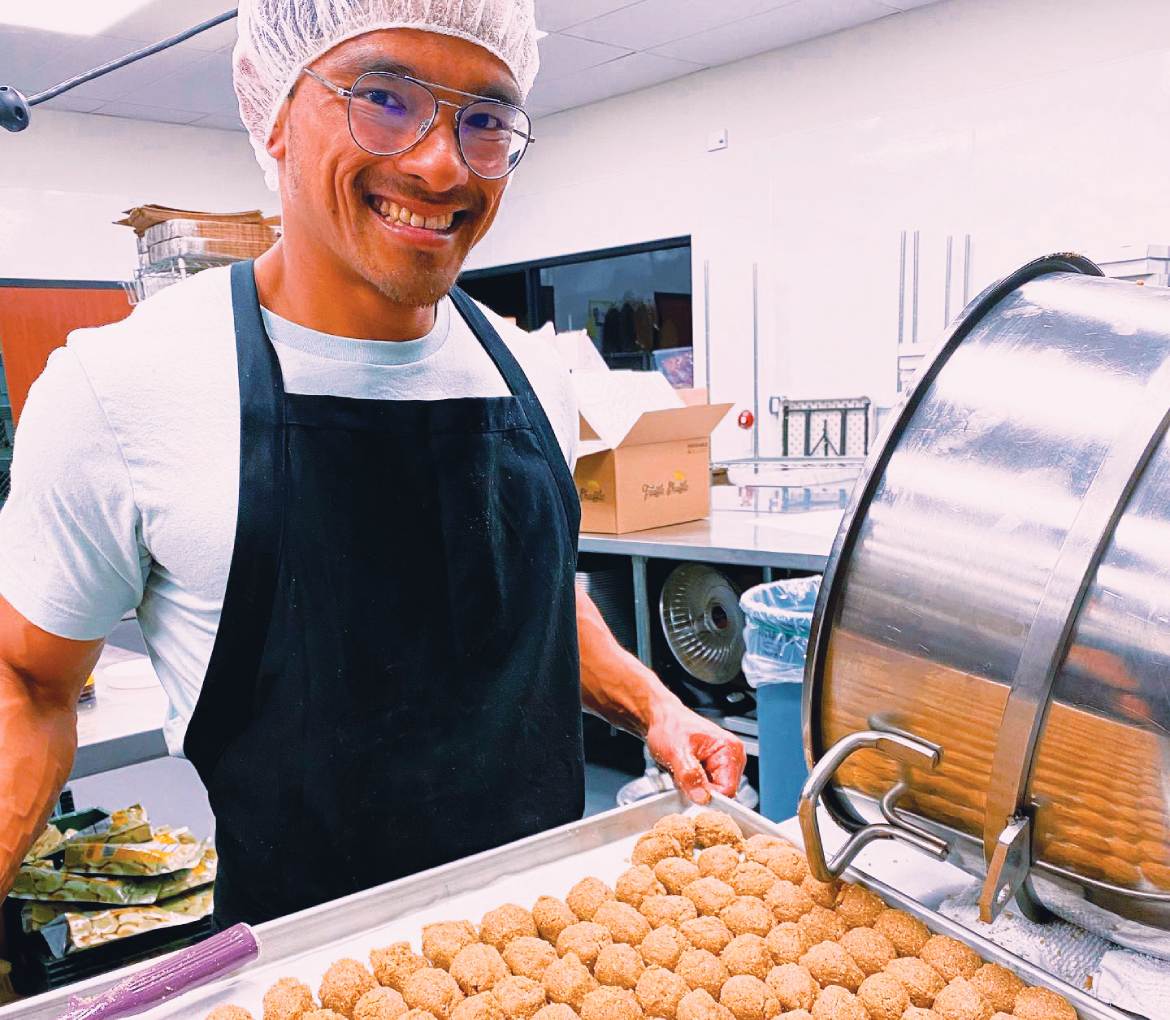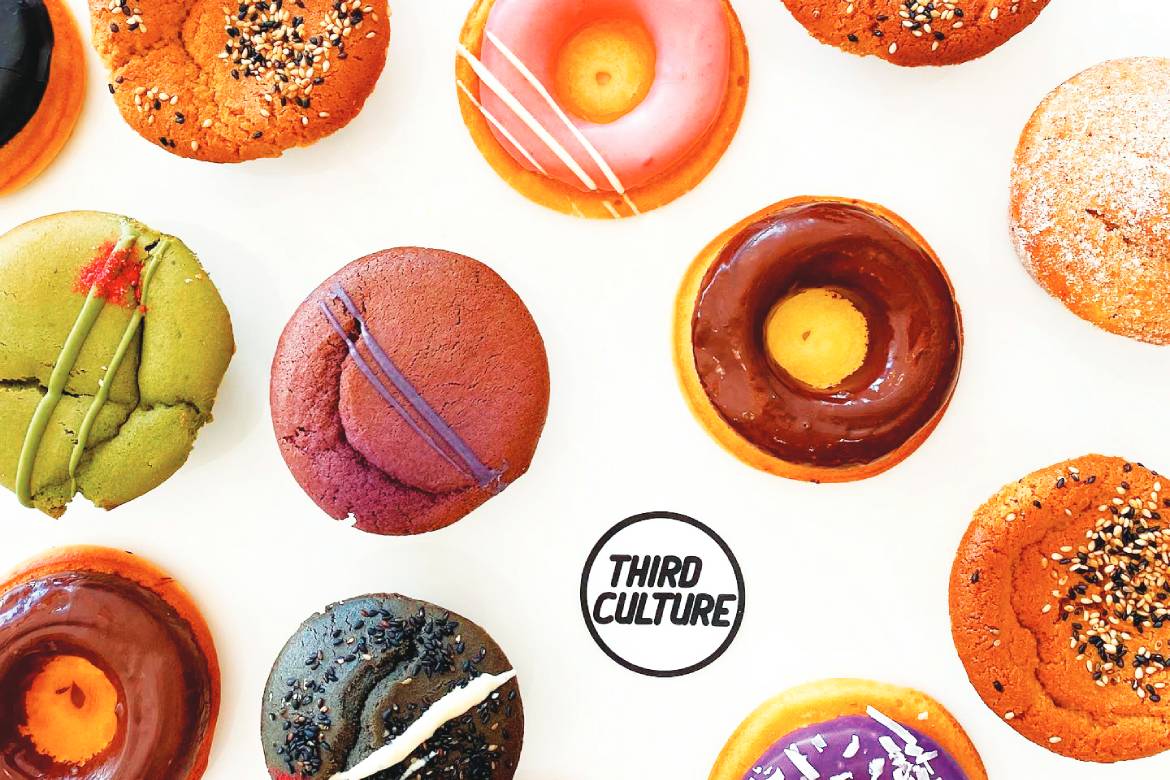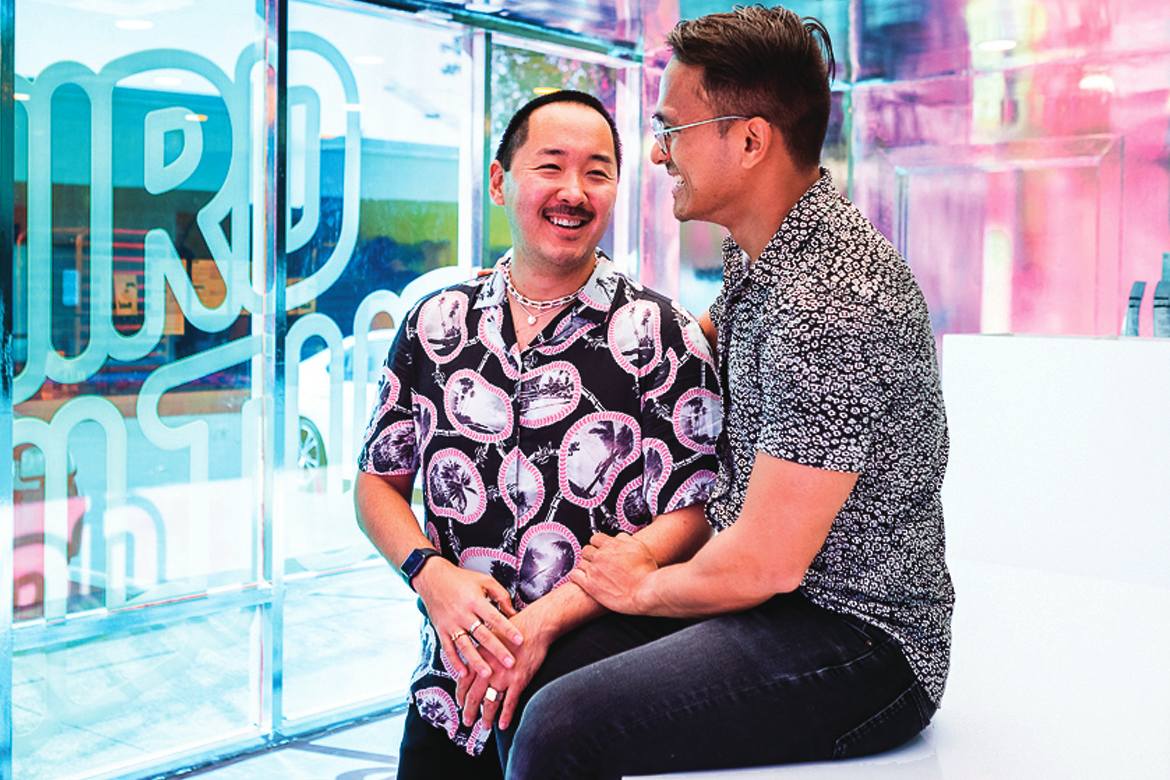Food is our love language,” says Wenter Shyu. The romantic and entrepreneurial partnership between Shyu and his husband, Sam Butarbutar, began over small batches of goodies they shared at a community bakers’ get-together in 2016.
The pair’s initial investment of just $3,000 has since blossomed into Third Culture Bakery (thirdculturebakery.com), a successful multi-location business that customers have embraced for not only its Asian-accented baked goods but its deeply-felt brand ethos.
Third Culture is a term used to describe individuals raised by immigrant parents, whose identities are highly influenced by their families’ adapted home country as well by their parents’ native culture.
According to academic studies, “Third Culture kids” are often subject to racial prejudice. They also frequently develop high cross-cultural sensitivity that can support open-mindedness and adaptability in diverse environments. The latter is certainly true of Shyu and Butarbutar.
Shyu immigrated to the U.S. from Taiwan at age six and grew up in Southern California. Butarbutar comes from an Indonesian family and grew up peripatetically, between Asia, Europe, and the east coast of the U.S.
Across four Third Culture Bakery retail outlets in the Bay Area (the two newest opening this past fall), a central kitchen and business headquarters in West Berkeley, distribution to local cafés, and a mail-order operation, the partners employ a team of over 35 whose backgrounds reflect the region’s ethnic diversity.
“There are a few folks who were born and raised here in the Bay Area,” says Shyu, “but even among them, most come from families whose roots are in Asian and Latin American countries.”
“We have family meals where the staff eats together and people bring in dishes made from their traditional recipes, so we’ll have someone with a Guatamalan background trying food from Bangladesh; or Taiwanese people eating Middle Eastern food. Once Sam and I took the whole staff out for dinner at a place that specializes in shabu-shabu [Japanese hot pot]; many of them had never tried it before. Our Christmas potluck is like a huge multicultural food exchange.”
CREATING A PARTNERSHIP
When they first met, Shyu, who had a background in visual merchandising, was working in non-profit marketing and trying to get a cupcake business off the ground. Butarbutar, who had more serious culinary experience both in upscale catering kitchens and as a sous-chef at San Francisco’s two Michelin star Lazy Bear restaurant, was looking to commercialize his distinctively chewy mochi muffins, developed from his mother’s recipe.
As their relationship developed, they decided to merge their entrepreneurial efforts, with Butarbutar overseeing recipe development and kitchen operations and hyu heading up sales, marketing, and public relations.
“We knew we wanted to lead with the mochi muffins,” says Shyu, who stayed at his day job through the bakery’s first year in business. “They were different than anything being offered at most cafés and they had unique flavor profiles that came out of Sam’s Indonesian upbringing.”
Dense, chewy and perfect to pair with a cup of hot coffee or tea, the small but satisfying muffins are made with glutinous rice (mochi) flour, premium butter, and coconut milk, which leads to a slightly crisp, carmelized outside and a rich, toothsome interior. In addition to his original brown butter flavor, Butarbutar has developed a rich black sesame iteration, a haunting matcha green tea flavor, and an eye-popping purple version flavored with ube, a sweet potato often incorporated in South Asian desserts.
While brainstorming names for their new bakery, Shyu introduced Butarbutar to the concept of Third Culture kids and it felt like a perfect fit. But the couple also shared a fourth culture of sorts, which came to the fore as they laid the groundwork for their partnership.

Third Culture Bakery Sam Butarbuta
“Both Sam and I came out to our families around the same time we were opening the business,” recalls Shyu. “Mine took it pretty well, but Sam had a huge falling out with his family and was pretty much alienated from both of his parents. The people on our team at the bakery have become a new kind of family for us.” As their business got underway, the couple’s Asian and gay identities were baked into the Third Culture Bakery brand.
“When we first started, we were really adamant that we needed to donate a portion of our sales to charity, or figure out other ways to do good with any success we had.” From the earliest days of their business, Third Culture donated muffins to 1951 Coffee, a no-profit Berkeley café that trains refugees and asylum seekers to work as baristas, then helps place them in long-term jobs. They also made regular donations to the San Francisco AIDS Foundation and other queer organizations.
RETAILING AND RETELLING
While the couple’s initial plan for Third Culture Bakery was built around wholesale production, it was a dip into retail that proved to be transformational for their business.
“We started with just six East Bay coffee shops carrying our muffins,” recalls Shyu. “But by the end of our first year, we had 70 accounts, including over the bridge in San Francisco. So many people told us not to try doing our own retail, that all the extra expenses would make it into a money dump.”
“But I think that almost everyone who starts to work in food has a dream of someday having their own brick-andmortar store, so Sam and I decided to open a service counter in the front of our bakery space.”
Business at the counter was boosted by an adulatory article in the food section of The San Francisco Chronicle, which in turn was noted and quickly followed up by Bon Appetit and Food & Wine, which published items on the bakery. Not only did the attention lift sales, it helped to strengthen the Third Culture Brand.
“When we started to get press inquiries,” recalls Shyu, “It gave us a chance to tell our stories.” The couple’s identity as Asian immigrants and loving gay partners became integral to public understanding of the Third Culture brand, resulting in both goodwill and eager new customers wanting to support the values it embodied.
The company’s central bakery and flagship café, located on a semi-industrial block of 8th Street in Berkeley, doesn’t seem a natural spot for retail traffic. But visit any day and you’ll find customers clustered on the benches outside the corrugated steel building sipping brightly colored matcha drinks and nibbling on Butarbutar’s expanded menu of vibrantly glazed mochi donuts, hot-off-the-iron mochi waffles, and creative pastry experiments incorporating Asian flavors like turmeric, mango, and passionfruit.
When Shyu and Butarbutar go in or out of their storefront, they are cheerfully greeted by their patrons, not so much as celebrity bakers, but as the friendly facilitators of the ad hoc, open-minded community they’re building, both at this shop and further afield.
GROWING PAINS, STRENGTHENED RESOLVE
By 2019, the couple had been invited to expand the brand by opening a branch in suburban Denver with start-up costs largely funded by a local development fund for restaurant assistance. But building out the space and dealing with administrative issues pushed the opening just a month and a half before the coronavirus pandemic began taking its toll on food service businesses.
“Because of the attention we’d gotten in California, there was a ton of coverage around our Colorado opening. To be honest, it became our cash cow. It felt really good. And then the world shut down. We kept the ovens on in both states by pivoting quickly and promoting national shipping. We’d built a huge Instagram following, which definitely helped.”
By summer of 2020, both shops had reopened and the partners optimistically began pursuing plans for second locations in both Berkeley and Denver.
“But something happened to the customers in Colorado,” Shyu recalls, visibly uncomfortable. “Everything felt like it shifted with the anti-Asian prejudice that came out in regard to the virus. Talking to some of our vendors and our customers there were moments where I was like, ‘Oh shit, I feel my skin color.’ We had to fire our PR firm in Denver because we sensed a lack of racial understanding. Coming from the Bay Area, we’d never really felt like this before.”
“It reached its worst point for me after the Atlanta spa shootings [in March, 2021]. Colorado and its surrounding states are very loose with their gun laws and open carry is allowed. I wasn’t sleeping at all. It was very visceral. I feared coming into my bakery and I feared for my employees.”
Still, amidst this anxiety and dwindling Colorado business that would eventually lead them to shut both of their Denver-area locations in late 2021, Shyu and Butarbutar felt a need to take action.
“Sam and I were donating to the GoFundMe pages of the Atlanta victims’ families, but we just didn’t feel it was enough. So we spoke to some of our older family members and to community organizations in the Bay Area who were dealing with the rise in anti-Asian violence and asked them what they needed. Together, we came up with the idea to supply safety kits with mini-pepper sprays and personal alarms that you could set off to attract attention in a situation where you felt threatened.”
The partners committed to paying for and assembling a few hundred kits and put the word out to several Asian-American senior homes and non-profits. The response was startling: Over 1000 kits were requested.
“I got volunteers to process all of the materials, assemble the kits, coordinate deliveries and collect new requests. It was as if we’d accidentally started a non-profit,” says Shyu.
“We’ve had stories get back to us that someone’s uncle was able to fend off an attacker by using the alarm; other people protected themselves with the pepper spray from the kits. But as much as that, our hope has been to make people just feel safe going about their normal lives. At rallies I would hear people say that they were skipping their walks in the park or avoiding walking their dog out of fear. We wanted to give people a sense of security.”
Since the program began, supported by donations made on the Third Culture website, at their stores, and through partner charities, over 25,000 free kits have been requested and distributed with instructions and safety tips in English, Spanish, and nine different Asian languages. In addition to Asian-American groups, Shyu and Butarbutar have offered the safety kits to queer and trans youth organizations.

Third Culture Bakery
BAKING WITH A GENTLE EMBRACE
While regrouping in Berkeley at the end of last year, Third Culture opened its second Bay Area café in the tony East Bay suburb of Walnut Creek. Shyu’s store design, which will also be featured at two additional locations in San Francisco’s hip Mission and Sunset districts, features prismatic window treatments that bathe the interior in multi-colored light.
“I want to be able to reference rainbows without being so literal,” he jokes. “Gay people don’t want to have giant rainbows everywhere!”
Still, like the striped heart stickers and glossy pink postcards that takeout customers find slipped into their bags, they underscore the bakery’s identity. The shops even sell plush toy versions of their muffins and donuts that are individually handmade by a customer, Tally Sue Szeto, allowing customers to literally embrace the Third Culture brand.
“We’ve had queer families come in,” says Shyu, “and some of the parents have actually come up and thanked Sam and I just for being here and running a community business where their kids can see a same-sex couple and a couple of different ethnic backgrounds running a business together.”
“And we try to represent that in everything we do. It’s the small activism of normalizing things for people who maybe come in just to have a muffin. Opening more locations is about spreading that message. We believe in karma, and that the more good we put out the more good will come back.”
You may also enjoy
Dallas Dish! A Delectable Destination For Foodies
Vicky Garcia: Co-Owner and Chief Operating Officer of Cruise Planners
VICKY GARCIA: CO-OWNER AND CHIEF OPERATING OFFICER OF CRUISE PLANNERS

